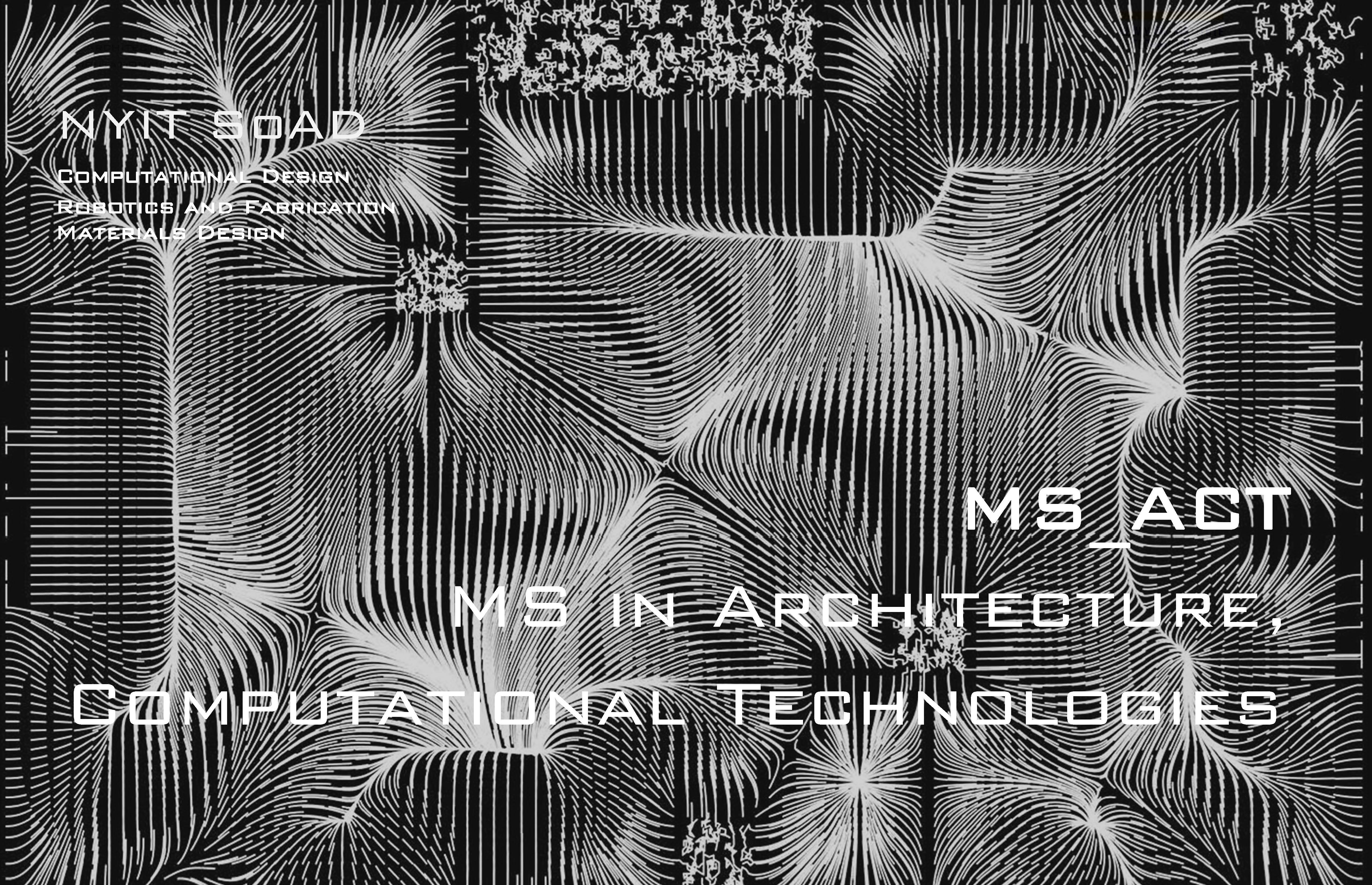Architecture Computational Technologies
Explore design research at the frontiers of architecture through experimentation in computational design, robotic systems applied to fabrication and interactivity, and materiality. For more information please contact ms.act@nyit.edu
MS in Architecture, Computational Technologies Program Information Session Fall 2022
NYIT SoAD MS ACT
New York Institute of Technology
School of Architecture and Design
MS in Architecture, Computational Technologies Program Information
Session 2021
Video of Information Session Fall 2022 explaining the MS ACT Program by Director Pablo Lorenzo-Eiroa. The video contains partial information and content that may be out of date. The Program may be modified for Fall
2022 pending approvals.
MS ACT Highlights
- History/Theory of Systems of Representation
- Science, Technology, Ecology, Architecture
- Computational Design, Programming (Python)
- Big Data, Survey, Simulation, Machine Learning (AI)
- Platforms and Applications Design
- Sensors, Robotic Interaction
- VR, MR, AR
- Robotic Systems Design
- Robotic Fabrication
- Composite and Responsive Materials, BioMaterials
- Materials Design
MS ACT Program Description from the MS ACT web site:
Explore design research at the frontiers of architecture through
experimentation in computational design, robotic systems applied to
fabrication and interactivity, and materiality. Innovate in design and
creatively apply emergent technologies to unconventional spatial
investigations resulting in full-scale architectural prototypes and
components.
The Master of Science in Architecture, Computational Technologies
(M.S.ACT) program is a two-semester (plus summer term), 30-credit,
post-professional master’s degree. The program integrates critical
relationships between science and culture, developing new technologies
with a focus on the history and theory of representation, robotics, and
cybernetics. You’ll learn how to apply, research, and develop
advancements in computational design, robotic interaction and
fabrication, and new materials.
The M.S.ACT program builds up expertise in three terms (Fall, Spring,
Summer), organized as core studios and seminars in three focus areas
(Computational Design, Fabrication and Robotics, and Materials) and
culminating with an interdisciplinary integrated Project-based Learning
Studio in the summer term.
Less
Computational Design
The first semester introduces history, theory and criticism of systems
of representation, robotics, and cybernetics. Through applied research,
students will acquire key skills in coding, algorithms, interfaces,
programming languages, big data survey processing and simulations,
augmented reality, computational modeling, machine learning, and
artificial intelligence applied to architecture and ecology. In
addition, students will be able to choose an introductory level elective
course from any of the three focus areas.
Fabrication and Robotics, and Materials
The second semester focuses on applied research on physical computation,
fabrication, and materials, including: programming microcontrollers,
robotic interactive responsive systems (survey, sensors, data link),
digital fabrication, robotic machine construction systems, and materials
simulation and optimization (new materials, biomaterials, live
materials, responsive materials, others). In addition, students will be
able to choose an advanced level elective course from any of the three
focus areas.
Project-based Learning
The third (summer) term integrates the acquired knowledge of the program
through interdisciplinary and transdisciplinary experimental applied
research at 1:1 scale, integrating the different concentration areas
(Computational Design, Fabrication and Robotics, and Materials) in a
full-scale interactive design and build prototypes at the Long Island
campus.
For More information and a Program Summary:
https://www.nyit.edu/degrees/architecture_computational_technologies_ms
More Posts
All PostsMay 31, 2022
MS_ACT INNOVATION KEYNOTE LECTURE Kaicong Wu
May 26, 2022
MS ACT Lecture Shai Yeshayahu
May 16, 2022
